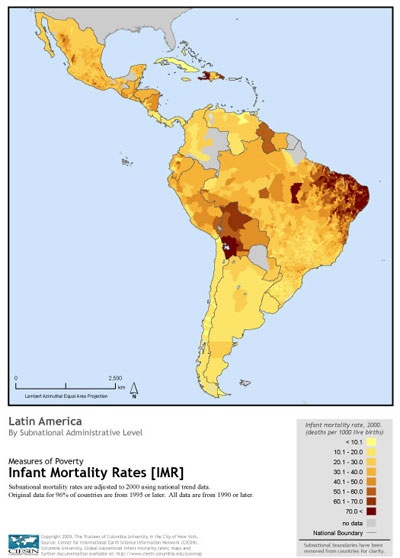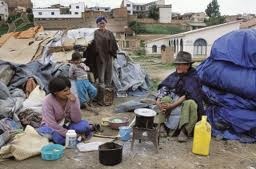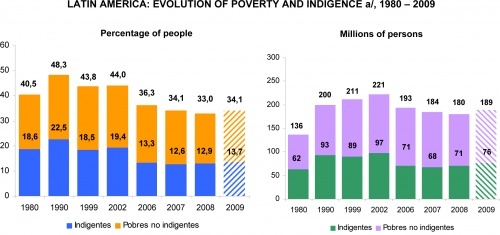


“Ten out of the fifteen most unequal countries in the world are in Latin America and the Caribbean,” said Helen Clark, the UNDP Administrator, the opening session of the 4th Ministerial Forum on Development in Latin America at UN Headquarters in New York. “While the region is not the poorest in the world, it is the most unequal.” The reasons for inequality in the region as continuing gaps in the quality of social services and access to them; institutional and regulatory challenges, including insecure property rights and limited access to justice, which affect the poor mostly; and a lack of opportunity for decent work.
Miss Clark stressed that countries in the region needed to address inequality through specific public policy instruments, rather than treat it as a by-product of successful poverty reduction programs : “Those instruments need to reflect the multi-dimensional nature of inequality across the economic, political, and social dimensions, and be designed to reach the poorest and most vulnerable people, including women, indigenous people and Afro-descendants,”
Below is more full text of Helen Clark’s remarks (May 6, 2011):
The importance of tackling inequality
While economic growth is important for long-term development progress, it does not automatically translate into poverty reduction and broadly based human development.
Often many people are left behind –women, ethnic and religious minorities, indigenous people, the disabled, the rural poor, or others who literally or metaphorically are at the end of the road– unable to benefit from economic growth or to access the services they need to improve their lives.
When we look only at averages of progress, the realities within countries can be masked. The simple truth is that inequality is a constraint on development, as well as being unfair. Studies, including those conducted by UNDP, suggest that countries with high income polarization and inequality may be:
• more likely to have social conflict;
• less competitive; and
• have less effective fiscal policy.
Ten out of the fifteen most unequal countries in the world are in Latin America and the Caribbean. While the region is not the poorest in the world, it is the most unequal, as measured by the Gini coefficient.
Last year, UNDP issued its first Regional Human Development Report for Latin America and the Caribbean. The report highlights how high levels of inequality in the region impact on human development, and analyzes why these inequalities persist over time.
The report demonstrates how inequality in income, education, health, and other dimensions, is transmitted from one generation to the next through various channels. It suggests that this situation, combined with low social mobility, has led the region to fall into an “inequality trap” from which is difficult to break out.
There are, however, some very encouraging signs. Recent UNDP studies show that a number of Latin American countries have experienced a decline in income inequality over the past decade.
That decline owes much to policies aimed directly at tackling poverty. There has been higher social spending, including through cash transfer programmes which now cover approximately one in every six people in the region.
Yet there are still what UNDP´s analysts refer to as “new margins of inequality”, where, despite great strides in poverty reduction and widened coverage of public services, inequality persists.
The reasons include:
• continuing gaps in the quality of services and access to them, and in human security;
• institutional and regulatory challenges, such as insecure tenure and property rights and poor access to justice, which impact most on the poor; and
• a lack of opportunity for decent work.
A central message of the Latin America and Caribbean Human Development Report, was that it is possible to break the persistent cycle of inequality in the region. It highlighted two essential steps:
• First, the reduction of inequality should be established as an explicit public policy objective. That means that rather than treat it as a desirable byproduct of successful poverty reduction programmes, inequality itself should be addressed through specific public policy instruments.
Those instruments need to reflect the multidimensional nature of inequality across the economic, political, and social dimensions, and be designed to reach the poorest and most vulnerable people, including women, indigenous people, and Afro-descendants.
• Second, enhancing the scope and effectiveness of policies to reduce inequality requires strengthening capacity to mobilize domestic resources. The tax burden in countries in the region ranges from ten to 23 percentage points lower than the average in other regions of the world, and tax evasion is widespread. Both issues need to be addressed if poverty and inequality are to be seriously tackled.
UNDP can assist with designing effective policy in these areas, drawing on the extensive experience gained and knowledge derived from our work around the world and across the development spectrum.
That brings me to the second issue I wish to address today: the place of middle income countries in today’s development landscape.
The place of middle income countries
Questions have been raised in some quarters about the relevance of development assistance to middle income countries, with some suggesting that they do not rate as a priority alongside the poorest and most fragile countries.
Yet, by some estimates, middle income countries are home to as many as seventy per cent of the world’s poor. If the objective of development co-operation is not only to help poor countries, but also poor people, then development partners need to continue to focus on the needs of middle income countries.
While many middle income countries are on track to achieve the MDGs, many also still have important development challenges related to inequality and social exclusion, environmental sustainability, and governance. If those challenges are not dealt with, then the stability and social cohesion needed for sustained development are undermined. It needs to be remembered that with the exception of Yemen, the Arab States´ uprisings in recent months have all been in middle income or net contributing developing countries.
Middle income countries are now playing important roles in the global development discourse. They are significant players in South-South co-operation, where their support is greatly valued.
UNDP has been taking a close look at its partnerships with middle income countries in the fast changing development landscape. The General Assembly has also asked UN agencies to consider how better to address the needs of middle income countries in their work.
UNDP is basing its work with and within middle income countries on the following considerations:
• We acknowledge that middle income countries share many common features, but that the income range within the category is wide, as is the range of development challenges they face. Diversity is the key word in describing the group. Therefore, UNDP’s response to addressing the needs of middle income countries should be based on a menu of approaches which can respond to country-specific circumstances.
• It is critical that UNDP’s work in middle income countries is driven by the needs of each country, but also that we are not merely reactive. We will therefore play an important advocacy role on issues like equality, inclusion, sustainability, and democratic governance because they are so important to human development.
• UNDP will also step up its dialogue with middle income countries as crucial contributors to global public goods and knowledge. We seek new strategic partnerships with middle income countries engaged in South-South co-operation, as we believe that our global network of country offices can work effectively to help share development experiences, best practice, and lessons learned.
As Latin America is overwhelmingly a “middle-income” region, I hope that these principles of UNDP engagement will resonate well with those present today. The place of the middle income countries in the new development landscape will also be discussed at UNDP’s Executive Board meeting next month, and we look forward to this region’s contribution to that discussion.
---
Related Reports:
---“Antonio Banderas/End Poverty!” -
diplomaticallyincorrect.org/films/movie/antonio-banderasend-poverty/25202
---“Rural Poverty” -
diplomaticallyincorrect.org/films/movie/rural-poverty/25999
By Ambassador Muhamed Sacirbey
Face Book at “Diplomatically Incorrect”
Twitter - DiplomaticallyX





